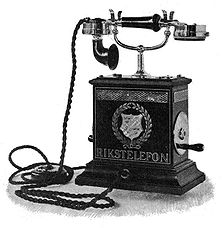- Magneto
-
For other uses, see Magneto (disambiguation).
A magneto is an electrical generator that uses permanent magnets to produce alternating current.
Hand-cranked magneto generators were used to provide ringing current in early telephone systems.
Magnetos adapted to produce pulses of high voltage are used in the ignition systems of some gasoline-powered internal combustion engines to provide power to the spark plugs.[1] The magneto is now confined mainly to engines where there is no available electrical supply, for example in lawnmowers and chainsaws. It is also universally used in aviation piston engines even though an electrical supply is usually available. This is because a magneto ignition system is more reliable than a battery-coil system.
Magnetos were rarely used for power generation, although they were for a few specialised uses.
Contents
History
Production of electric current from a moving magnetic field was demonstrated by Faraday in 1831. The first machines to produce electric current from magnetism used permanent magnets; the dynamo machine, which used an electromagnet to produce the magnetic field, was developed later. The machine built by Hippolyte Pixii in 1832 used a rotating permanent magnet to induce alternating voltage in two fixed coils.[2]
Power generation
For more details on this topic, see Magneto (generator).Magnetos have advantages of simplicity and reliability, but are inefficient owing to the weak magnetic flux available from their permanent magnets. This restricted their use for high-power applications. Power generation magnetos were limited to narrow fields, such as powering arc lamps or lighthouses, where their particular features of output stability or simple reliability were most valued.
Bicycles
One popular and common use of magnetos of today is for powering lights on bicycles.
Most commonly a small magneto, termed a bottle dynamo, rubs against the tyre of the bicycle and generates power as the wheel turns.
More expensive and less common but more efficient is the hub dynamo.
Although commonly referred to as dynamos, both devices are in fact magnetos, producing alternating current as opposed to the direct current produced by a true dynamo.
Medical use
The magneto also had a medical use for treatment of mental illness in the beginnings of electromedicine. In 1850, Duchenne, a French doctor, developed and manufactured a magneto with a variable outer voltage and frequency, through varying revolutions by hand or varying the inductance of the two coils, putting out or putting in both ferromagnetic cores.
Ignition magnetos
Main article: Ignition magnetoMagnetos adapted to produce impulses of high voltage for spark plugs are used in the ignition systems of spark-ignition piston engines. Magnetos are used in piston aircraft engines for their reliability and simplicity. Motor sport vehicles such as motorcycles and snowmobiles use magnetos because they are lighter in weight than an ignition system relying on a battery. Small internal combustion engines used for lawn mowers, chain saws, portable pumps and similar applications use magnetos for economy and weight reduction. Magnetos are not used in highway motor vehicles which have a cranking battery and which may require more control over ignition timing than is possible with a magneto system.
Telephone
 1896 Telephone, hand crank for magneto on right (Sweden)
1896 Telephone, hand crank for magneto on right (Sweden) For more details on this topic, see Telephone magneto.
For more details on this topic, see Telephone magneto.Many early manual telephones had a hand cranked "magneto" generator to produce a (relatively) high voltage alternating signal to ring the bells of other telephones on the same (party) line and to alert the operator. These were usually on long rural lines served by small manual exchanges, which were not "common battery". The telephone instrument was "local battery", containing two large "No. 6" zinc-carbon dry cells.
See also
References
- ^ Selimo Romeo Bottone (1907). Magnetos for Automobilists, how Made and how Used: A Handbook of Practical Instruction in the Manufacture and Adaptation of the Magneto to the Needs of the Motorist. C. Lockwood and son.
- ^ Alfred Urbanitzky (Ritter von), Richard Wormell Electricity in the service of man: a popular and practical treatise on the applications of electricity in modern life, Cassell & Company, limited, 1886 page 227, preview on Google books
Categories:- Electrical generators
Wikimedia Foundation. 2010.

